|
|
|
Sort Order |
|
|
|
Items / Page
|
|
|
|
|
|
|
| Srl | Item |
| 1 |
ID:
088137
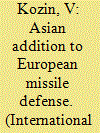

|
|
|
|
|
| Publication |
2009.
|
| Summary/Abstract |
THE GEORGE W. BUSH ADMINISTRATION, which has departed from the political arena, has left new President Barack Obama not only a host of unresolved regional problems, but also an array of issues concerning such a sensitive subject as arms control. The White House has effectively shelved such problem areas as further reduction of strategic offensive weapons (capabilities), tactical nuclear weapons, and control over five key types of conventional weapons in Europe, failing, together with its NATO partners, to ratify the well-known Treaty on Conventional Armed Forces in Europe (CFE).
Now Moscow and Washington will also have to deal with such a sensitive issue as the so called European missile shield - i.e., the deployment of U.S. strategic missile defense systems in Poland and the Czech Republic, planned by the previous Republican administration for deployment by 2011 - if established, they will account for around 25% of the U.S.'s entire strategic missile defense capability.
In this context, special attention also needs to be given to such a problem as the strategic and tactical missile defense system 1 that the United States has widely deployed and constantly upgrades in the Asia Pacific region - a system that has been left, as it were, outside the international debate due to the prominence given to Washington's plans to extend its "missile shield" to eastern Europe, closer to the Russian borders
|
|
|
|
|
|
|
|
|
|
|
|
|
|
|
|
| 2 |
ID:
088155
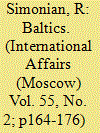

|
|
|
|
|
| Publication |
2009.
|
| Summary/Abstract |
THE OCCUPATION DOCTRINE adopted by the Baltics serves as a legal basis for resolving a whole array of many practical and ideological issues. Discrimination against hundred of thousands of those who permanently live in the region is one of such issues. In Estonia where certain posts are banned for them they are also kept away from the polls in parliamentary elections; Latvia has gone even further - certain population groups cannot elect local administrations. The financial claims to Russia are also part of the occupation doctrine.
The very much discussed and deliberately fanned occupation issue contradicts common sense. Can we describe as occupation the regime under which the "occupied" enjoyed the same rights as the "occupants"; there was no "occupation regime" in the Baltic republics and no military administrators (Germany, for example, appointed its Gauleiters in the occupied territories); there were no other attributes of an occupation regime. In fact, it was the legally elected parliaments of Latvia, Lithuania and Estonia that in 1940 passed a decision to join the USSR. The fact that the 1991 decisions on independence were passed by their Supreme Soviets, bodies of the "occupation regime," makes the discussion of occupation a political oddity.
|
|
|
|
|
|
|
|
|
|
|
|
|
|
|
|
| 3 |
ID:
088142
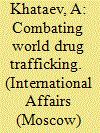

|
|
|
|
|
| Publication |
2009.
|
| Summary/Abstract |
GLOBALIZATION AND REGIONAL INTEGRATION help to erase economic distinctions between nations and continents, eliminate trade barriers and offer broad opportunities for further progress. It is unfortunate, however, that these changes in international relations and state systems are being skillfully used in drug trafficking, which has taken on transnational proportions. As a reflection of these opportunities, it is to a certain extent both a cause and an effect of important changes in global politics and economics.
A number of experts in Russia and elsewhere see many factors that help transnational drug trafficking to have such great influence on today's world.
The first factor is the political and economic instability in some countries. The organized drug-related crime weakens the protective functions of systems that form the state and government institutions and worsens the crisis in these countries through the use of considerable sums from drug trafficking for attaining political and economic objectives and through instigating and maintaining ethnic conflicts.
Furthermore, there are either no laws or there are flawed laws, or the observance of laws is not monitored while the socioeconomic problems worsen and there are corrupt officials accepting kickbacks from drug traffickers. In their attempts to keep their business and evade punishment, drug dealers stoke up corruption by funneling a large proportion of their proceeds into bribing officials, obtaining the necessary information and creating conditions for laundering the money made through drug trafficking.
|
|
|
|
|
|
|
|
|
|
|
|
|
|
|
|
| 4 |
ID:
088153


|
|
|
|
|
| Publication |
2009.
|
| Summary/Abstract |
THE YEAR 2009 marks the birth centenary of Andrei Andreevich Gromyko. Most diplomats of my generation and an important number of current ambassadors, top- and medium-ranking Foreign Ministry officials worked under him in some or other capacity. They were learning the ropes of the intricate art of conducting foreign policy under very harsh Cold War conditions in the illustrious shade of the Master of Diplomacy of the 20th century. Each of us must remember him in their own way.
I was fortunate to have had a chance to learn from many people the hard job (if you take it seriously) of a diplomat who must acquire the knowledge of many sciences and skills, special techniques (not unlike those of a musician) of this largely unique trade, erudition, logic and verbal skills. A.A. Gromyko was someone you could learn all these from.
From a distance, Andrei Gromyko seemed to be the cold and inaccessible summit of the Himalayas. At a closer range he was different - an attentive and calm person with a gentle sense of humor which he was trying to conceal. He wasn't dour by nature and more often than not he was concentrated and lost in his thoughts. At the same time he was of course a multifaceted character. I was fortunate to be one of his subordinates to see him at work at a close enough range. At first I was member of his secretariat and then worked under him as member of the Foreign Ministry Collegiums and head of the USA and Canada Department.
|
|
|
|
|
|
|
|
|
|
|
|
|
|
|
|
| 5 |
ID:
088150


|
|
|
|
|
| Publication |
2009.
|
| Summary/Abstract |
ASIDE FROM INSPIRING WELL-UNDERSTOOD EMOTIONS, any anniversary, be it state, public, or personal, gives a pretext for looking into the past, evaluating the present, and thinking about the future.
The Diplomatic Academy boasts a glorious and remarkable past. Its rightful precursor, Tsarskoe Selo Lyceum, was where the diplomatic cadre began to be trained on the systematic basis for the first time in Russia's history.
In the Soviet period (which started with experiments in the spirit of Leon Trotsky's "guideline" that ordered to "shut down this shop" (People's Commissariat of Foreign Affairs), it was soon realized that diplomats could not be trained in a haphazard manner and that no less reliable a system was needed than the one that existed before the October 1917 revolution. But the appropriate decision was long in coming. It was not until 1934 that an Institute for the Training of Diplomatic and Consular Workers under the USSR PCFA was formed.
|
|
|
|
|
|
|
|
|
|
|
|
|
|
|
|
| 6 |
ID:
088154


|
|
|
|
|
| Publication |
2009.
|
| Summary/Abstract |
MY APPOINTMENT TO THE SECRETARIAT of the USSR Ministry of Foreign Affairs in early July of 1979 came shortly before the 70th birthday of Andrei Andreevich Gromyko at the peak of his popularity and influence as one of three CPSU Central Committee Politburo members whose word, at that period, was decisive in laying down the home and foreign policy of the country with a universally recognized great power status.
Before taking up my new duties I had, as was the rule, to learn, from inside and in a brief span of time, about the workings of the Secretariat beginning with the duties of a night duty officer. I will never forget the few anxious nights I spent on my own in the deserted and securely locked up portion of the building outside the open door to the minister's office (to hear if any of the hotline telephones installed inside and nowhere else should ring, * in permanent readiness to respond to any, often unexpected calls coming to the impressive battery of phones of the government communication line at the side table of the minister's senior aide.
|
|
|
|
|
|
|
|
|
|
|
|
|
|
|
|
| 7 |
ID:
088156


|
|
|
|
|
| Publication |
2009.
|
| Summary/Abstract |
THIS COMING APRIL, many countries will be marking the 60th anniversary of the establishment of the North Atlantic Treaty Organization (NATO). The following documents from the Foreign Policy Archive of the Russian Federation - a note by the USSR government to the U.S. administration, dated March 31, 1954, and a reply from the U.S. administration, dated May 1954 - refer to a crucial stage in the history of the Cold War. After Joseph Stalin's death, serious changes occurred in the Soviet policy. The USSR's successes in building nuclear and hydrogen bombs ended the U.S. monopoly over weapons of mass destruction. Acute confrontation in international relations, with the former anti-Nazi allies - the Berlin crisis and the War in Korea - gave way to a certain measure of warming in relations.
In March 1954, the Soviet government put forward a proposal to the governments of the United States, Great Britain, and France concerning the creation of a collective security system in Europe - the signing of an all-European collective security treaty and the possibility of the USSR's joining NATO. In May, Moscow received notes from the Western powers, all of them similar in content, with a negative reply to its proposals. The exchange of notes continued in the following months of 1954: The Soviet note of July 24 was followed by notes from the three Western powers of September 10, to which the USSR replied on October 23.
|
|
|
|
|
|
|
|
|
|
|
|
|
|
|
|
| 8 |
ID:
088151


|
|
|
|
|
| Publication |
2009.
|
| Summary/Abstract |
THE WORLD HAS COME TO THE LINE beyond which there are changes, probably much more radical than those of the late 1980s. The financial and economic crisis that in some countries is developing into a political one made this abundantly clear to the expert and analyst communities; political establishment, too, has finally arrived to the same conclusion: election of Barack Obama confirms this. The energy of liberalism swept aside, under the "end of history" banner, the dividing walls, regimes, social and cultural models, ethnic traditions of national economies, ideologies and even the efforts to sort out the developments giving no chance to those who tried to find other, better ways of civilizational development. This tactics can no longer be used.
|
|
|
|
|
|
|
|
|
|
|
|
|
|
|
|
| 9 |
ID:
088141
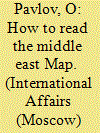

|
|
|
|
|
| Publication |
2009.
|
| Summary/Abstract |
THE ARAB-ISRAELI CONFLICT In the Middle East has been one of the most sensitive international political issues for the past 60 years. Looking back over the years, one cannot help recognizing that during this period the Middle East, like a train running at full speed, has not once been on the verge of war, but at the same time it has also passed the stations called "Peace" without stopping.
There are many reasons for that, and it would not be much of an exaggeration to say that mountains of books have been written on the subject by now. By the early 1990s, the majority of analysts and participants in the events agreed in that one of the most serious external impediments to the process of ending the Arab-Israeli confrontation - i.e., the Cold War - was over, and the traffic lights on the road to peace had turned green. Reality, however, proved to be far harsher and grimmer. Since then the region has at least twice been on the edge or even over the edge of new wars and man-made disasters, drinking from the cup of hostility, not friendship.
Without delving too far into history, I would like to consider briefly the stages that the Middle East has gone through since the end of the Cold War (the Cold War period is a special subject), and why peace is still elusive.
|
|
|
|
|
|
|
|
|
|
|
|
|
|
|
|
| 10 |
ID:
088144
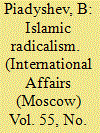

|
|
|
|
|
| Publication |
2009.
|
| Summary/Abstract |
EXPERTS, ACADEMICS, political scientists and politicians gathered for a round table discussion at the Diplomatic Academy of the Ministry of Foreign Affairs of the Russian Federation to talk about Islamic radicalism, one of the hottest issues on the Russian and Central Asian agenda.
A. Pushkov, Director of the Institute of Contemporary International Studies at the Diplomatic Academy(ICIS), pointed out that the transition from unipolar America-dominated world to a multipolar world order added even more urgency to the issue under discussion.
Below is the whole range of opinions offered by the guests at the round table.
S. Nikolaev (Deputy Director, Third Department of the CIS Countries, Ministry of Foreign Affairs of the Russian Federation) deemed it necessary to point out that Russia wants stability and security in Central Asia to be able to strengthen its strategic and allied relations with the local states, to address together the entire range of regional problems including terrorism, extremism and illegal drug trafficking.
Russia is also involved in bilateral humanitarian cooperation; it pays particular attention to the defense of the rights and interests of compatriots, is doing a lot to preserve the positions of the Russian language in these countries, to expand the Russian educational, cultural and information space in all of them. Those involved in these activities are fully aware of the potentials offered by the civil society as a whole and the Russian World Foundation in particular.
The political heavyweights - China, America, Japan, and the European Union - are displaying more interest than before in Central Asia. This does not worry Russia: for objective reasons sooner or later Central Asia will be integrated into wider cooperation formats which will add vigor to competition in all spheres. The Russian Federation does not claim the role of a monopolist in all Central Asian developments and is open for cooperation with other states.
|
|
|
|
|
|
|
|
|
|
|
|
|
|
|
|
| 11 |
ID:
088147


|
|
|
|
|
| Publication |
2009.
|
| Summary/Abstract |
THE ARMED CONFLICT IN THE CAUCASUS that was started by the current Georgian leadership in August 2008 is a textbook example of an unlawful use of military force by one party and the lawful use of force by another.
In 1974, the UN General Assembly adopted a definition of aggression: Although the document is not legally binding, it has a great political weight. In accordance with this definition, "an attack by the armed forces of a State on the land, sea or air forces, or marine and air fleets of another State" constitutes an act of aggression.1 Only the UN Security Council may decide on whether a particular act falls under the definition of aggression, but the sheer use of force first entails the right to use force in response. Indeed, one of the targets of a premeditated attack by Georgian troops was a Russian unit as part of the Joint Peacekeeping Force. The Russian battalion in South Ossetia was under Russian command, in contrast to the coalition force deployed on the basis of a UN Security Council resolution to conduct peacekeeping operations as part of national contingents, placed under the UN's operational command. As a matter of fact, the attack was made against a Russian state power agency that was outside the Russian Federation on legal grounds, which aroused legitimate counteraction on the part of the latter.
|
|
|
|
|
|
|
|
|
|
|
|
|
|
|
|
| 12 |
ID:
088152


|
|
|
|
|
| Publication |
2009.
|
| Summary/Abstract |
LET ME FIRST OF ALL thank the heads of the Diplomatic Academy for the invitation to elucidate some matters connected with the foreign policy of the Republic of Bulgaria with an emphasis on regional cooperation. I accepted the invitation as a great honor and simultaneously as a real challenge, considering the level of information and competence that this audience enjoys.
In the early 21st century we are facing a number of challenges, old and new, with the realities urging us to be not only well-informed but also, and primarily, equal to the considerable changes in the world as a whole and, in particular, ones in the areas and manifestations that we designate as the field of diplomacy.
|
|
|
|
|
|
|
|
|
|
|
|
|
|
|
|
| 13 |
ID:
088148
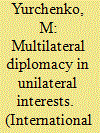

|
|
|
|
|
| Publication |
2009.
|
| Summary/Abstract |
ACCORDING TO STATEMENTS of American officials, the United States is committed to multilateral action in foreign policy. Now that a new administration moved into the White House, it is worth recalling the approaches of the previous administration. President George W. Bush said that American interests are best served by addressing problems with strong partners.1 The USA thinks multilateral diplomacy is essential for such efforts. These strong partners include the United Nations, the Organization of American States, the Asia-Pacific Economic Cooperation forum or many other international organizations where the United States plays a part and its diplomats work hard for. 2
The U.S. National Security Strategy issued in 2002 said: "We are also guided by the conviction that no nation can build a safer, better world alone. Alliances and multilateral institutions can multiply the strength of freedom-loving nations. The United States is committed to lasting institutions like the United Nations, the World Trade Organization, the Organization of American States and NATO as well as other long-standing alliances." 3
|
|
|
|
|
|
|
|
|
|
|
|
|
|
|
|
| 14 |
ID:
088149


|
|
|
|
|
| Publication |
2009.
|
| Summary/Abstract |
NATIONAL ARCHETYPES PLAY AN IMPORTANT ROLE in foreign policies of all countries; in case of Russia it is the historical traditions Muscovy inherited from Byzantium that determined, and still determine, the general development trends of the Russian statehood. The Byzantine heritage manifested in the idea of "Moscow the Third Rome," determined, to a great extent, Russia's mission in the world. Realized in foreign policy it produced amazing results: a vast state that gathered Russians and Orthodox Christians together with other ethnic groups and religions under the wing of the Russian and Soviet empires. However every time the Great Russia idea was rejected-in the early and late 20th century - the Russian statehood collapsed resulting in "a major geopolitical disaster of the century
|
|
|
|
|
|
|
|
|
|
|
|
|
|
|
|
| 15 |
ID:
088146
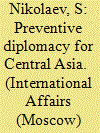

|
|
|
|
|
| Publication |
2009.
|
| Summary/Abstract |
COUNTRIES IN CENTRAL ASIA are exposed to a number of conflict-provoking threats: terrorism and extremism, drug trafficking and organized crime. Turning to the UN for good services in this context looks logical since the UN has many tools to react to such threats and experience in settling the most diverse conflicts.
This led to the establishment in Ashgabat of the new international agency - the UN Regional Center for Preventive Diplomacy for Central Asia (UNRCCA).
As early as November 2004, Turkmenistan proposed the creation of UNRCCA. The initiative was backed by Kazakhstan. Next there followed a series of consultations between representatives of all five Central Asian states who gave this idea their unanimous approval and agreed to headquarter the Center in the capital of Turkmenistan.
On May 7, 2007, UN Secretary General Ban Kimoon informed the chairman of the UN Security Council Zalmay Khalilzad that, in line with the UN Global Counter-Terrorism Strategy and recommendations of the High-Level Panel on Threats, Challenges and Change pertaining to the need to boost the UN potential for the prevention of conflicts, he intended to establish UNRCCA in Ashgabat.
|
|
|
|
|
|
|
|
|
|
|
|
|
|
|
|
| 16 |
ID:
088143
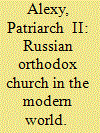

|
|
|
|
|
| Publication |
2009.
|
| Summary/Abstract |
THE INTERNATIONAL ACTIVITY of the Russian Orthodox Church today has four main areas of development. The first priority is to preserve the unity of the Church and ensure the spiritual life of the extensive church diaspora living outside the canonical territory of the Russian Orthodox Church (ROC). The second priority is to develop fraternal relations with all local Orthodox churches. The third priority is of a religious-public nature, and it is to maintain dialogue with other Christian confessions and organizations, as well as with representatives of Islam, Judaism, and Buddhism on matters relating to the preservation of moral values in the modern world. Finally, the fourth priority could be defined as the ROC's cooperation with the foreign policy agencies of various states, as well as with international public and interstate organizations in the interest of preserving peace and the fundamental values of public life.
Presently, the ROC is the largest local church in the Orthodox world. Orthodoxy is not an ethnic religion of Russians, Ukrainians, Belarusians, Moldovans or other peoples. It is global Christianity committed to preserving apostolic faith. It is open to the individual of any ethnic background. The church is a living and tangible embodiment of this principle, since it comprises representatives of numerous nationalities. The ethnic diversity of the Russian Orthodox Church is a source of its vitality and its weal.
One important goal of the Moscow Patriarchy is to preserve and uphold church unity, which is currently being confronted with some challenges. The unity of the church, bequeathed by the apostles, is a great value and should be appreciated as such not only by the bishops but also by each cleric and lay person. Church unity is the treasure that our predecessors preserved despite the ordeals that they had had to go through. This gift, augmented over centuries, cannot be dissipated overnight for the sake of time serving political considerations. Unfortunately, presently, there are ongoing attempts to destroy the sacred space of Holy Rus', created by St. Prince Vladimir, and spread discord and disharmony between millions of Orthodox Russians, Ukrainians, Belarusians, Moldovans, and representatives of other ethnic groups comprising the multiethnic flock of the Russian Orthodox Church
|
|
|
|
|
|
|
|
|
|
|
|
|
|
|
|
| 17 |
ID:
088136
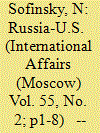

|
|
|
|
|
| Publication |
2009.
|
| Summary/Abstract |
"THE STATUE OF LIBERTY as a symbol for America was replaced with Guantanamo" - this is how Zbigniew Brzezinski described his country in a recent interview with the Der Spiegel magazine. The former U.S. presidential national security advisor, now a respectable political expert and foreign policy consultant for the B. Obama administration, made such a grim assessment of the eight-year performance by George W. Bush, the 43rd U.S. president.
Which of this is reality and which is rhetoric is a question that has yet to be answered. Wide-ranging, harsh criticism along many lines should be expected to continue. Positive shifts should be expected to become somewhat more pronounced. The "pro" and "con" arguments will take final shape. Without laying claim to an exhaustive analysis, I would like to offer some personal judgments on this score in so far as concerns Russia and Russian-U.S. relations in the foreseeable future.
George W. Bush's two presidential terms coincided with a period of development that was very special to us. Without repeating some well-known truisms, I would like to reiterate that it was a period of stabilization, a period of political, economic and intellectual "straightening out," or "concentration" according to Gorchakov, which our country went through after the critical period of the turmoil and upheavals of the 1990s. We returned into the world's top 10 economies, acquiring quite an impressive, international political weight, although not regaining our former weight, and finally, proceeding with our creative internal reform.
|
|
|
|
|
|
|
|
|
|
|
|
|
|
|
|
| 18 |
ID:
088139


|
|
|
|
|
| Publication |
2009.
|
| Summary/Abstract |
IN THE MIDDLE EAST Russia concentrates, to a great extent, its political-diplomatic efforts at creating a sustainable and reliable security system in the zone (or sub-region) of the Persian Gulf occupied by eight states: Bahrain, Iraq, Iran, Qatar, Kuwait, United Arab Emirates (UAR), Oman and Saudi Arabia. Its mineral wealth - about two-thirds of the world's explored reserves of oil and about one-third of the world's gas reserves - has made it critically important for global economic and energy security.
The current situation that has taken several decades to reach the present stage is best described as permanent instability worsened by repeated crises. The best illustration of many faults of the unipolar world, it was shaped by a series of bloody armed conflicts: the Iran-Iraq war of 1980-1988; the Kuwait crisis and the Desert Storm of 1990-1991 and the 2003 war in Iraq.
Since the early 1980s, the United States has been positioning itself as the main source of stability in the Gulf zone, a sphere of its vital interests.
|
|
|
|
|
|
|
|
|
|
|
|
|
|
|
|
| 19 |
ID:
088140
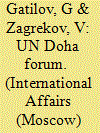

|
|
|
|
|
| Publication |
2009.
|
| Summary/Abstract |
THE GLOBAL FINANCIAL AND ECONOMIC CRISIS put a noticeable imprint on the preparations for the International Conference on Financing for Development, held at Doha, Qatar, from November 29 to December 2, 2008, and even made certain countries doubt the timeliness and expediency of that undertaking. But eventually a responsible approach prevailed, which made it possible to inscribe that high-level conference within the planned timeframe, with delegations from 169 UN and EC member-states (40 of them led by the heads of state and government) attending.
Thus, despite the intensification of the financial and economic crisis, the world community confirmed its resolve to work for the attainment of the Millennium Development Goals (MDG) set by the UN 2000 Summit. Yet another important step forward was made that secured the consistency of the course launched during the high-level events on assistance to Africa and on the MDG progress, which were held within the framework of the 63rd Session of the UN GA in New York on September 22 and 25, 2008.
The Doha Conference held a special place among those events. There is a growing awareness in the world that an effective solution to the development funding problems is crucial to success in all other vectors, be it the halving by 2015 of the numbers of people living in extreme poverty, reduction of child and maternal mortality levels, the fight against dangerous infectious diseases, including HIV/AIDS, malaria, and TB, or universal elementary education, access to drinking water, gender equality and sustainable ecological development parameters.
|
|
|
|
|
|
|
|
|
|
|
|
|
|
|
|
| 20 |
ID:
088157
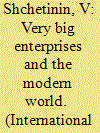

|
|
|
|
|
| Publication |
2009.
|
| Summary/Abstract |
The book under review is an attempt to delineate primarily the latest trends in the development of TNC. One of the most important new trends is the rapid growth of especially big corporations which are not merely becoming the more influential actors in world economy, but are increasingly claiming for themselves the decisive position in world politics and setting the tone for the entire political and cultural life on the global, regional and national levels.
Company reports, stock exchange bulletins, and appraisals made by many teams of researchers in particular by those of Fortune magazine, that have been published regularly since 1954 as well as ratings of 500 biggest companies around the world make it possible to contend that the impact of especially large TNC has been steadily growing between the end of the 20th century and at the start of the 21st century.
|
|
|
|
|
|
|
|
|
|
|
|
|
|
|
|
|
|
|
|
|